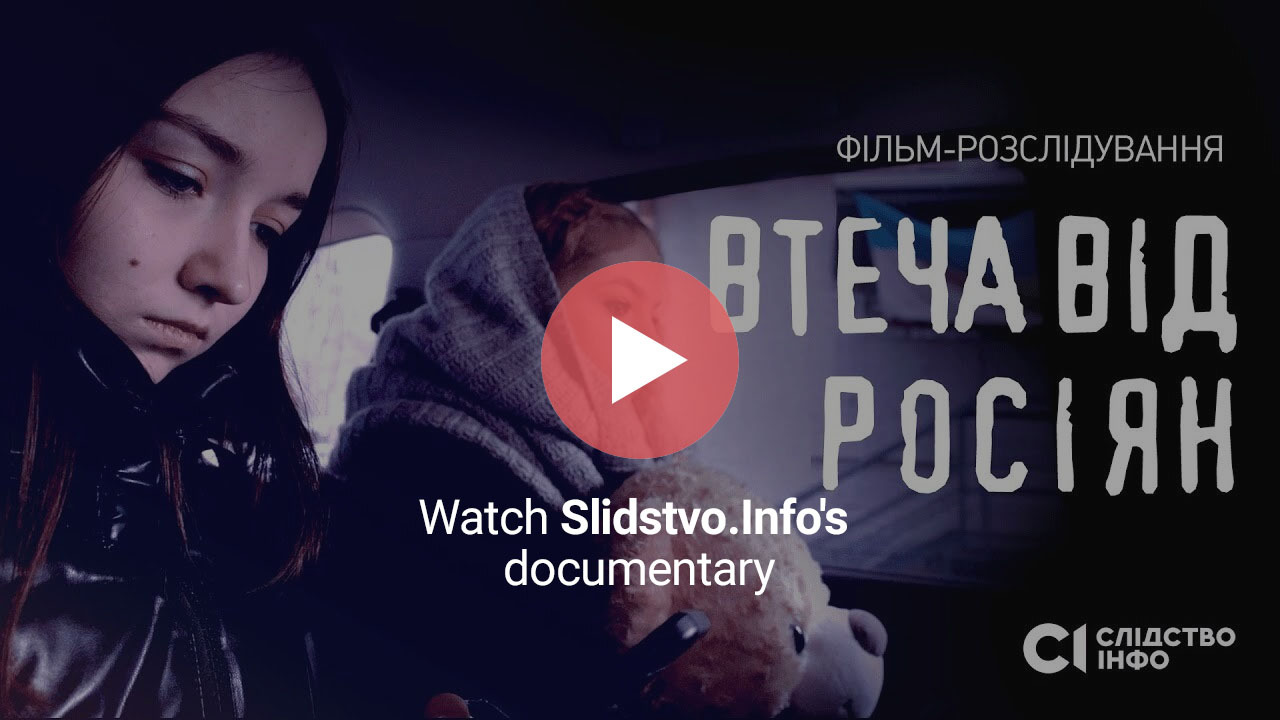Two girls from occupied Kherson were taken far from home and kept for months in prison-like conditions — until journalists helped them flee. Hundreds or perhaps thousands more Ukrainian children remain in Russian hands.
How Two Ukrainian Teenagers Escaped Russian Captivity
Published: 31 March 2023
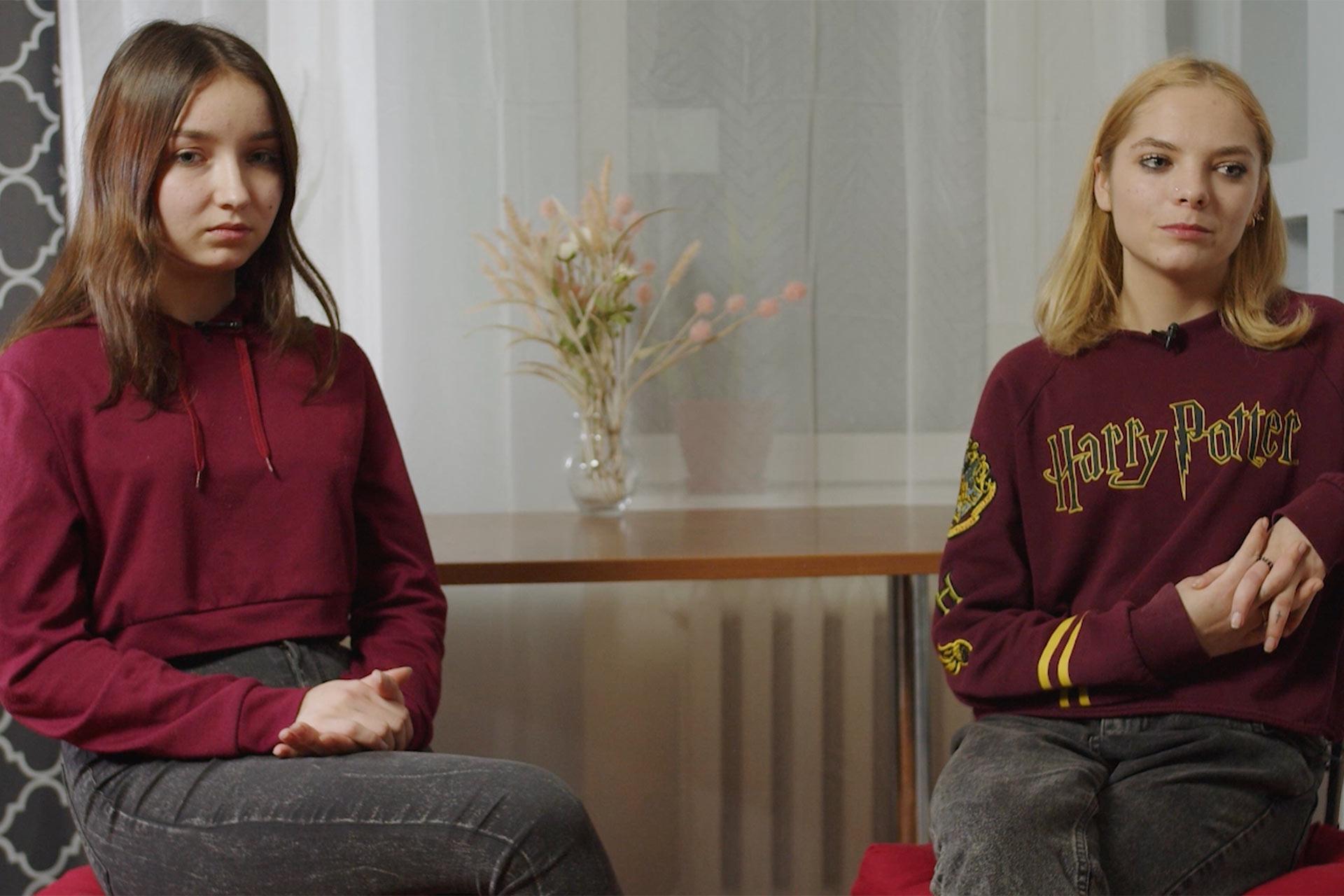
Nastia Mitrofanova and Masha Senchuk, two Ukrainian girls who were held against their will in occupied territory. (Photo: Slidstvo.Info)
By Anna Babinets (Slidstvo.Info) and Yuliya Khymeryk (Slidstvo.Info)
“They told everyone to stand up. They were going to play the Russian anthem,” recalls Masha Senchuk, a teenager in a maroon Harry Potter shirt.
“Well, a few other girls and I didn’t stand up for the anthem. So they kept us there and started berating us.”
The 17-year-old from the Ukrainian city of Kherson is describing what, at first, was meant to be nothing more than a vacation arranged by Russian authorities: A two-week trip from her then-occupied hometown to a Crimean resort.
But what she and her best friend thought would be a sun-filled break from the dreariness of wartime life turned into a months-long ordeal after they were held against their will, pressured to take Russian citizenship, and housed in abysmal conditions under the close supervision of Russian minders.
Journalists from OCCRP’s Ukrainian member center, Slidstvo.Info, got in touch with the two Ukrainian girls last fall after learning of their plight from their social media posts. Communicating in secret, they told of being kept as virtual prisoners far from home after being tricked into traveling to Crimea.
They and hundreds of other Ukrainian children were pressured to abandon their native language and become Russian citizens. As the weeks dragged on, the two friends described verbal abuse and terrifying threats, all while capturing photos and videos of their spartan living conditions.
The pressure seemed to grow day by day, and journalists knew that publishing the materials they had obtained could put the girls in serious danger. Finding little help from Ukrainian authorities, they decided to help Nastia and Masha escape from the Russians and return to Ukraine.
A new documentary just released by Slidstvo.Info tells the story.
On March 17, the International Criminal Court issued an arrest warrant for Russian President Vladimir Putin and Maria Lvova-Belova, his commissioner for children's rights. They are accused of being personally responsible for the large-scale illegal deportation of Ukrainian children to Russian-controlled territories, a war crime under international law.
The Ukrainian government says that several hundred thousand children have been forcibly taken to Russia, and that over 19,000 specific cases have been identified.
Only a few hundred have made it back home, says Daria Gerasymchuk, Ukraine's Presidential Commissioner for Children's Rights.
“Behind each of these numbers is the fate of a rescued child,” she says. “As well as a complex operation specially designed [to bring them home].”
Before Russia's full-scale invasion of Ukraine in February 2022, Nastia and Masha were both studying culinary arts in Kherson, a thriving port city of nearly 300,000 people.
But Kherson was occupied in the early days of the war as the Russian army swept through the region, and any prospect of remaining in school quickly disappeared. During the first months of the occupation, the Russians pulled down Ukrainian symbols, hung Russian flags, and installed a puppet administration. Some educational institutions fled the city; those that remained were seized and subjugated.
After six months, however, Masha applied to study at a university in Kherson that had been taken over by the Russians. Although no classes were being held, her admission came with a perk: an offer of a free seaside holiday in Crimea.
Although the girls lived just a few hours’ drive away from the peninsula, once a popular summer vacation destination for Ukrainians, they had never been there. Russia seized Crimea in 2014, when they were 7 and 8 years old.
“I told Nastia that we could go together,” said Masha. “She also quickly enrolled, and we went.”
Masha and Nastia say that they left without their parents’ approval, and that teachers “helped” them both with their permission documents. In Masha’s case, they accepted a document signed by her cousin, though it should have been filled out by her parents. In Nastya’s case, she says, a woman signed in place of her mother and indicated her age as 17 instead of 18, because the Crimean resort would not accept a legal adult.
“We were told that we were going there for two weeks, just children going on vacation,” Nastia says. “We thought, 'Oh, great, we'll see Crimea, we'll have a rest.’”
On October 8, 2022, Nastia and Masha began their journey. Along with hundreds of other children, they were taken to the Crimean resorts in over a dozen buses. The two friends ended up at a resort called Zdravnytsia in the city of Evpatoriya.
That’s where their “re-education” began: Russian anthems, Russian studies, Russian rules.
Still, Nastia recalls, these first days weren’t so bad. “In general, it was more or less normal,” she says, “if we had really been there for two weeks and taken back.”
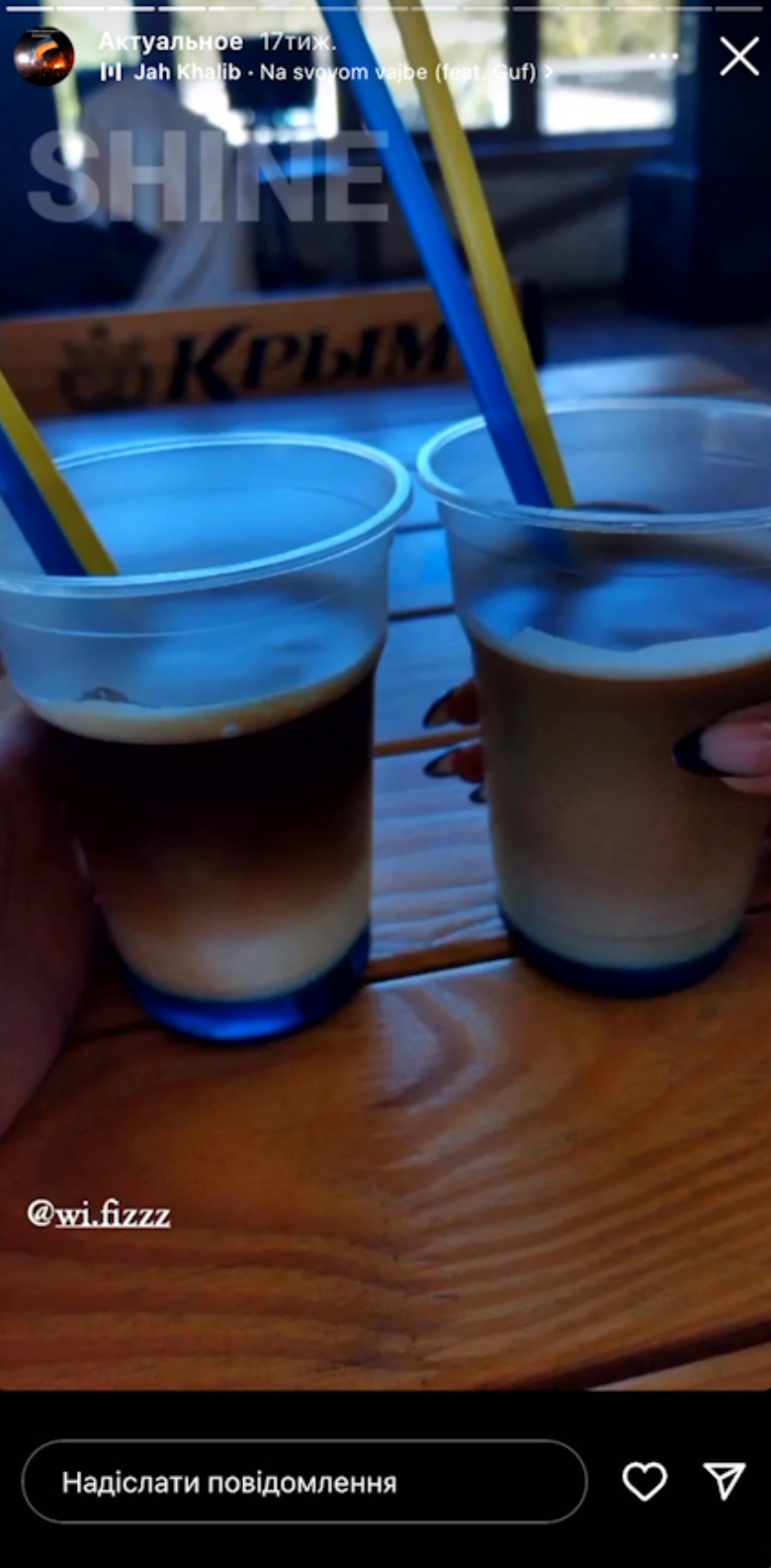 Throughout their stay, the girls signaled in their social media posts that they remained loyal to Ukraine, cheering President Zelensky’s speeches on television and strategically placing blue and yellow straws — the colors of the Ukrainian flag — in their Instagram pictures. (Photo: Slidstvo.Info)
Throughout their stay, the girls signaled in their social media posts that they remained loyal to Ukraine, cheering President Zelensky’s speeches on television and strategically placing blue and yellow straws — the colors of the Ukrainian flag — in their Instagram pictures. (Photo: Slidstvo.Info)
But as the deadline approached, the girls could see they weren’t about to be brought home. When they asked the resort director if they could return to Kherson, he said no.
His justification was that the return trip was unsafe: The Russian position in the region was becoming precarious under Ukrainian fire.
Then, on November 11 — over a month after Masha and Nastia arrived in Crimea — the Ukrainian army liberated their home city. The Kherson children rejoiced at the news, Nastia recalls, one girl running through the halls yelling “Kherson is free! Glory to Ukraine!” But they also realized the news meant they’d probably never go home.
"The occupying state knew what it was doing," says Kateryna Rashevska, a lawyer at the Ukrainian rights organization Regional Center for Human Rights. "The girls were misled … They were informed that [their trip] was for a certain period of time, to Crimea, for vacation. In fact, these are aspects of child abduction."
In late December, Masha and Nastia were suddenly transferred to a nearby Russian-occupied Ukrainian town, Henichesk, and placed in a local college.
"They brought us to a dormitory and gave us the most horrible room,” Masha says. “We went in and I started crying. It was very cold.”
It was at this point that Slidstvo.Info journalists found the girls through their social media posts. At reporters’ request, they filmed their bare-bones living conditions. It was the height of the freezing Ukrainian winter, but the rooms were not heated, they said, and administrators refused their requests for more blankets and electric heaters.
“Nastia and I slept in the same bed to keep warm," Masha recalls. In showers shared by the entire floor there was hot water only once a day, for fifteen minutes at a time.
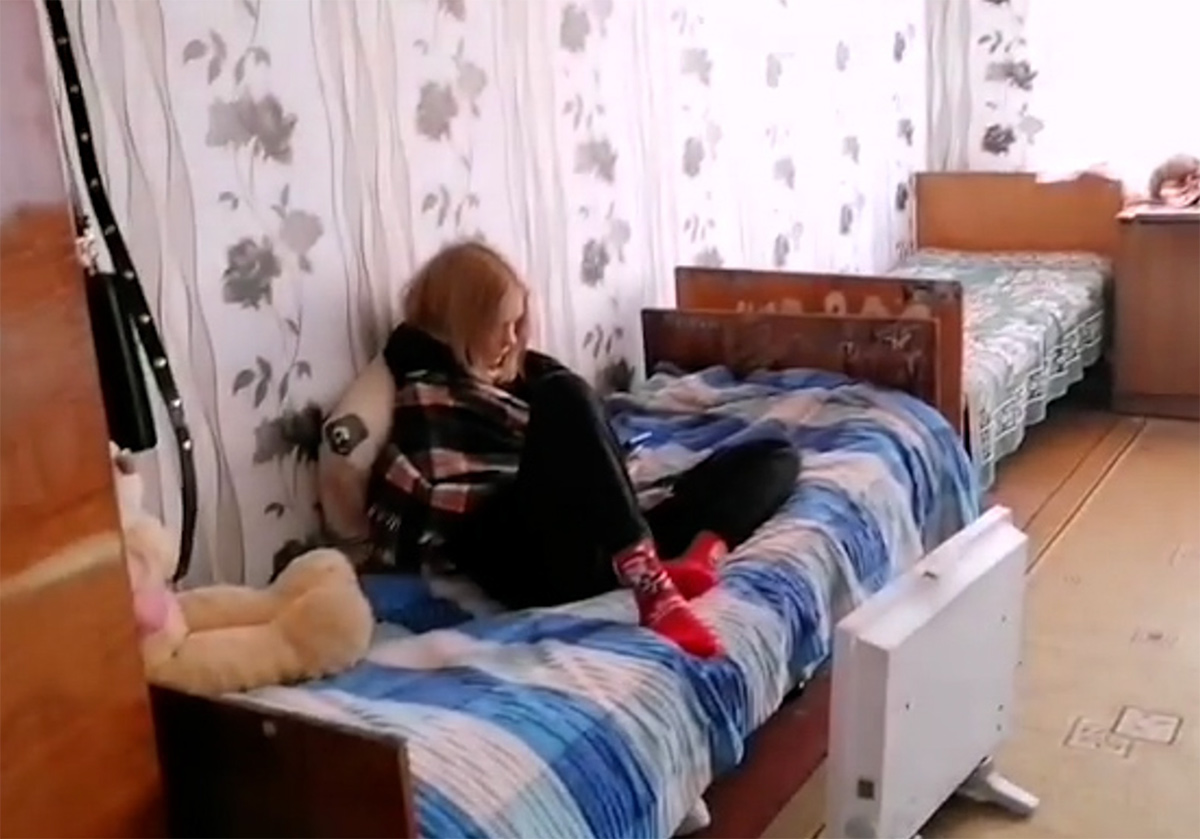 Masha tries to keep warm in her cold dormitory in a photo the girls sent to reporters. (Photo: Slidstvo.Info)
Masha tries to keep warm in her cold dormitory in a photo the girls sent to reporters. (Photo: Slidstvo.Info)
“We were under special control there, they often checked us,” Nastia says. “The ‘ordinary children’ [local students] could go out for a walk, but when we, for example, went out, they asked us where we were going. I say, ‘To the store.’ And they say, ‘why?’”
Though both girls are most comfortable speaking Syrzhik, a mix of Russian and Ukrainian, they were pressured to switch to Russian.
"We were forced to write in Russian at school. I understood what they were saying, but I still wrote in Ukrainian. I don't know how to write in Russian. I thought that if I learned to write in Russian, then I would become unused to writing in Ukrainian."
“We didn’t want to study in that college at all,” Masha adds.
On one occasion, Nastia says, a man told her: “Let me give you a Russian book, you’ll learn little by little.”
“I’m like, ‘no, thank you,’” she recalls. “‘I’m going back to Ukraine.’ Then he started saying something about naivete. They tried to convince me that if I leave, it will be to Russia or nowhere at all.”
The girls say college administrators told all the Ukrainian children to apply for Russian passports, because they would have exams in the summer and could not pass without Russian documents.
The Ukrainian authorities consider such treatment a sign of genocide — an attempt to wipe out an entire people and their culture. Gerasymchuk, the children’s rights official, says that when the government interviewed children who had managed to return to Ukraine, they told of being completely cut off from their families and urged to assimilate.
"Almost all of the children who were taken away, the Russians immediately took away their cell phones, meaning that they did everything to prevent the child from … reuniting with their families," she says.
“The Russians are forcing Ukrainian children to learn Russian language, culture, and history, to love Putin and to thank him for their salvation. By placing them under the care of Russian citizens, they are ‘nullifying’ them as much as possible and erasing their identity as part of the Ukrainian nation. They want to raise fighters who will then go against Ukraine.”
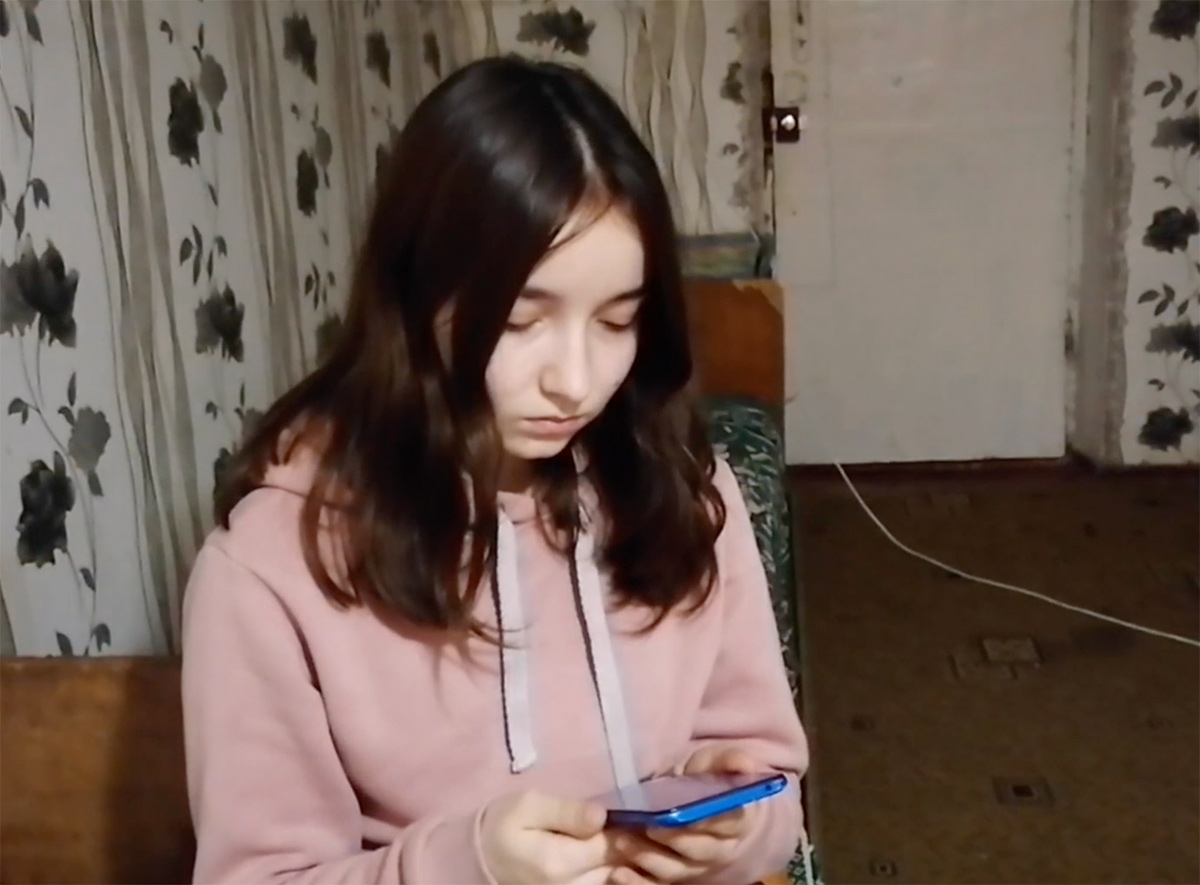 In a scene recorded by Masha, Nastya speaks with reporters. (Photo: Slidstvo.Info)
In a scene recorded by Masha, Nastya speaks with reporters. (Photo: Slidstvo.Info)
Masha and Nastia’s situation grew tenser. Their treatment was getting worse: One day, they begged a journalist to “take them out by Monday.”
“We were told that people from the [Russian] military commandant's office were coming on Monday," Nastia told reporters.
The soldiers had been known for their aggression against children who had shouted Ukrainian patriotic slogans, she said, threatening to “sew their mouths shut with black thread.” She heard that two boys had been taken to something called “the pit.”
Desperate to extricate the girls, journalists contacted several hotlines, including the Ministry of Reintegration, Ukraine’s human rights ombudsman, and an NGO called Save Ukraine. None would take responsibility for the removal of minors without official parental permission.
Masha's mother did not want her to return to Ukraine at all, pressing her to get a Russian passport and stay in occupied territory. Her father — to whom Masha wanted to return — did not support the Russians, but was afraid she could be hurt or killed if she tried to escape.
Reporters decided that the only way was to organize the girls’ escape themselves. Taking advantage of a weekend leave to visit one of their mothers, Nastia and Masha left the dormitory.
But though college administrators expected them back by Monday, by then the girls were on their way home.
The details of the journey cannot be revealed here, for fear that other Ukrainian children won’t be able to use the same avenues of escape. But their trip toward Ukraine first took Nastia and Masha much deeper into Russia. On a series of buses and private cars arranged by reporters, the girls traveled for four days on a roundabout journey that included multiple countries — even though their hometown was just 200 kilometers from where they started.
To help them pass a number of borders and checkpoints, they concocted a story that they were going to attend a wedding in St. Petersburg. They entered a reporter on their phone as “Aunt Yuliya,” and communicated with her as if she were a relative.
Reporters knew that, once the girls were missed, the Russian authorities could issue a search warrant for them. If the message reached border authorities in time, the girls could be prevented from leaving the country when the authorities checked their passports.
Whenever they could, the girls updated reporters about their progress, though there was a frightening period when they went offline.
The worst part, they say, was at the final Russian border checkpoint before they entered the European Union.
“We were outside for five hours, there were many checks of our documents. It was snowing heavily and it was very cold," Nastia recalls. They were especially worried about Masha, who could be refused passage because she was underage.
“I went up first, Nastia stood behind me," Masha says. “I gave the border guard my documents. He called somewhere and asked if I could pass. They said yes, he stamped the documents and gave them back.”
Finally, the girls were back in Kyiv after 11 months under Russian occupation. They marveled at hearing Ukrainian spoken on the streets and seeing prices in stores in hryvnias instead of rubles.
Nastya remained in Ukraine’s capital, while journalists brought Masha, the younger girl, back to her father Vitaliy, who now lives in a small city in central Ukraine.
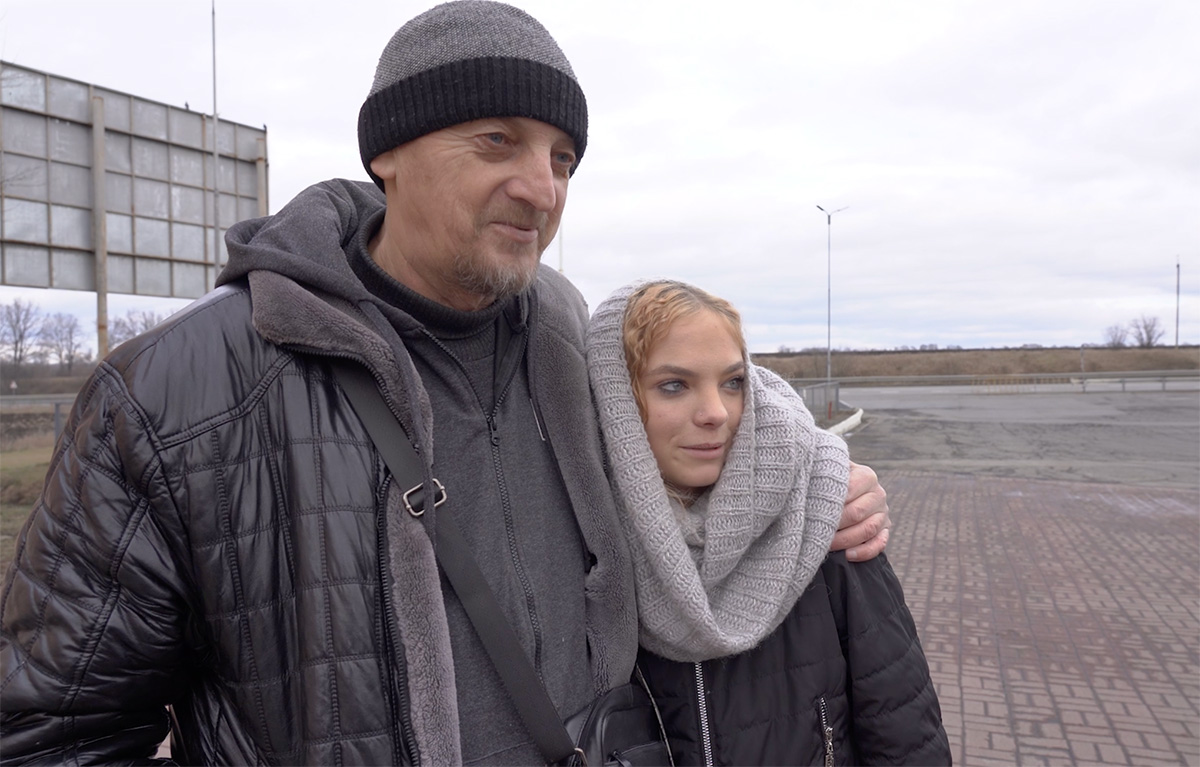 After her months-long ordeal, Masha is reunited with her father Vitaliy. (Photo: Slidstvo.Info)
After her months-long ordeal, Masha is reunited with her father Vitaliy. (Photo: Slidstvo.Info)
"I didn’t know that Masha had left,” Vitaliy said, “If I had known, I wouldn’t have let her go."
He also said that he had spoken by phone with one of his daughter’s teachers at the college in Henichesk.
The teacher complained that Masha had abandoned her studies. “I tell her: ‘She studies in Kherson. She studied and is still studying,’” Vitaliy remembers. “She says, ‘let's not get into politics.’”
“They kill our children, pregnant women, and say: ‘Let’s not talk about politics.’”
With reporting by Yanina Korniienko.
